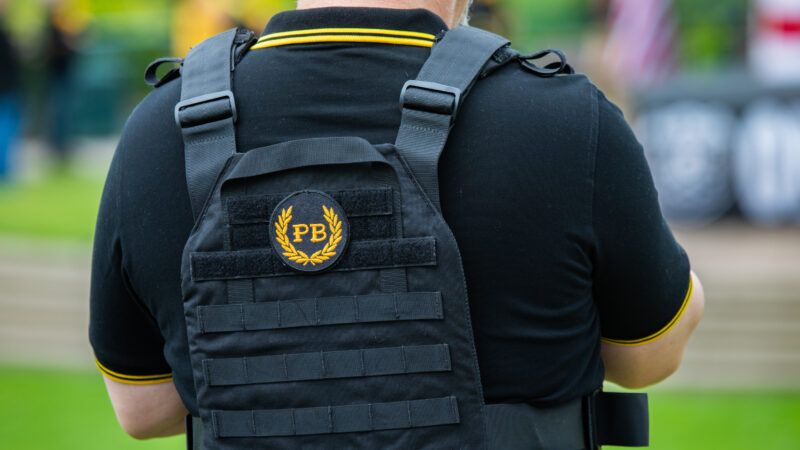Prosecutors Appeal Proud Boys' Prison Sentences Over January 6 Riot
Prosecutors asked for longer prison sentences at trial and now seem to be trying again.

It's been more than two-and-a-half years since the January 6, 2021, Capitol riot, in which a violent mob tried to prevent Congress from certifying Joe Biden's electoral win over Donald Trump. In that time, the government has charged hundreds of people for their actions on that day, securing over 600 years in collective prison sentences. Among the most severely punished were members of the far-right Proud Boys organization, who received sentences between 10 to 22 years each.
Yesterday, federal prosecutors filed notices of appeal in the cases of five convicted Proud Boys in an apparent attempt to secure even more prison time.
In May, a Washington, D.C., jury convicted Proud Boys leader Enrique Tarrio and group members Joseph Biggs, Ethan Nordean, Dominic Pezzola, and Zachary Rehl on charges related to their actions on January 6. All except Pezzola were also convicted of seditious conspiracy, defined as when "two or more persons" conspire "to oppose by force the authority" of the U.S. government "or by force to prevent, hinder, or delay the execution of any law of the United States."
Pezzola received the shortest sentence at 10 years in prison. Rehl received 15 years, Biggs received 17 years, and Nordean received 18 years. Tarrio received 22 years, the longest sentence, even though he wasn't even in the city on the day of the riot.
But in each case, federal prosecutors had asked for considerably longer sentences: 20 years for Pezzola, 27 years for Nordean, 30 years for Rehl, and 33 years each for Biggs and Tarrio.
On Monday, federal prosecutors filed notices of appeal for each of the five men. The government is also currently appealing the sentence of Oath Keepers founder Stewart Rhodes, who received 18 years in prison after prosecutors asked for 25.
Granted, the Proud Boys's actions on January 6 are indefensible: Members, including the defendants, openly and unashamedly fought with police. Pezzola gained entry to the Capitol building by using a riot shield he had stolen from an officer to smash a window.
But it's far from clear that longer sentences are necessary or warranted. As Reason's Jacob Sullum has written, prosecutors "never showed that the defendants explicitly planned to disrupt congressional certification of Biden's victory," instead seeming to act impulsively in the moment. And Tarrio, of course, wasn't even in the city during the violence, though according to the Department of Justice, he did claim credit for it after the fact.
Further, it feels like sour grapes for the government to go back for more time. Prosecutors sought and received a terrorism enhancement for each of the five defendants, which allows for more severe sentences if the offenses constituted terroristic acts. U.S. District Judge Timothy Kelly disagreed with the prosecutor that the events of January 6 were "no different than the act of a spectacular bombing of a building," though he did ultimately say that "the constitutional moment we were in that day is something that is so sensitive that it deserves a significant sentence."
Reason's Christian Britschgi wrote after Tarrio's sentencing that most defendants, "including many who directly participated in the riot, have received much more modest sentences of a few months to a few years," whereas others "who chose to take it to trial instead of pleading guilty" receive sentences of a decade or more, an example of the so-called "trial penalty" in which defendants who choose to go to trial receive significantly harsher punishments than those who plead guilty.
Case in point: A sixth defendant in the same case, Charles Donohoe, pleaded guilty in April 2022 and agreed to cooperate with prosecutors. While he has not been sentenced, the maximum sentence is seven years, and as a cooperating witness, he will likely get much less.
The five convicted Proud Boys clearly committed heinous acts of violence with apparent political motivations, and incarceration may well be merited. But going back and appealing decade-plus prison sentences with the intention of making them even longer, as the government is doing now, is wholly inappropriate.


Show Comments (129)